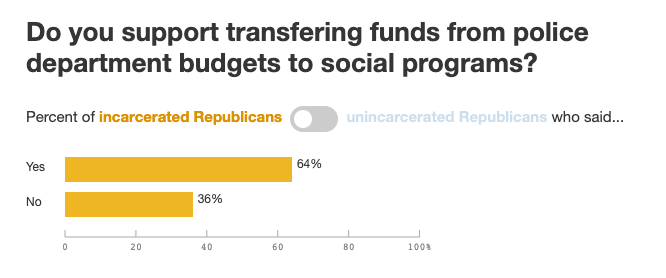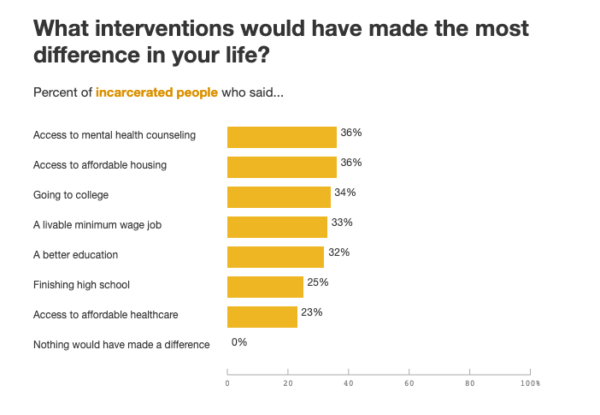
The Marshall Project has published the results of a political survey of incarcerated people, and they are extremely interesting. In a previous installment, they refuted the widely-held belief in broad support for Democrats behind bars; the majority of white prisoners would vote for Trump if they could. The current installment, in which the respondents were invited to opine on criminal justice policy, is just as interesting. Among other findings, even though there was a marked racial divide on questions about police violence and support for Black Lives Matter, 64% of incarcerated Republicans supported transferring funds from policing to social programs, by contrast to only 5% of incarcerate Republicans.
I highly recommend reading the whole thing, and have just one comment to make. In the survey, respondents were invited to comment on the kinds of interventions that would have kept them from prison, and they did list some of the “usual suspects”:

But the article then comments that many respondents ascribed the responsibility for their incarceration solely to their own behavior.
This is worth commenting on, because it dovetails with one of my findings fromYesterday’s Monsters, namely, the insidiousness and proliferation of “programspeak.” Programspeak is more than a jargon–it’s a worldview that is propagated in prison rehabilitative programming, all of which is geared toward telling the parole board a story of personal responsibility. At parole hearings, where the concept of “insight” is kind, there is a constant pressure on people to attribute their incarceration only to their own failings, without any allowance for environmental factors.
Now, there is nothing wrong with encouraging people to be accountable, and I think Marxist theories of crime take things too far when they divorce criminality from anything involving personal autonomy; even when choices are very constrained, we see evidence of agency (and to say otherwise is incredibly insulting to the large majority of people from disadvantaged backgrounds who don’t commit crime.) But adults with complex worldviews should be able to account for criminality in a way that does not discount the robust evidence of environmental factors, including poverty, difficult family lives, lead exposure, governmental neglect, lack of educational and vocational opportunities, and understandable, class- and race-based resentments. Unfortunately, this is not how it plays out on parole, where any effort to contextualize one’s personal history prior to the crime of commitment can be interpreted as “minimizing” or “lack of insight.”
This “programspeak” of personal accountability bleeds over to almost all other prison programming. I should know; I volunteered with, and visited, many of them. But it also bleeds out of the prison experience and accompanies people in their lives on the outside. In his ethnographic study of reentry, Alessandro de Giorgi found this self-attribution is so insidious that even after reentry, people blame themselves for not having a roof over their heads or basic groceries to feed their families.
Given the pervasiveness of programspeak, I’m not surprised to find that the folks surveyed by the Marshall Project emphasized their own responsibility. It’s being drilled into them throughout their incarceration. If anything, it’s a miracle that despite this aggressive, programmatic indoctrination, they articulate environmental factors as well. And to the extent that, after everything we know, people still subsribe to this heavyhanded partly-false consciousness, much of it is going to crumble because of the contrast between the consistent pressure on individuals to take responsibility for their actions and the equally consistent reluctance of prison systems to take even a shred of responsibility for what is being done to them, especially in the context of COVID-19.




No comment yet, add your voice below!